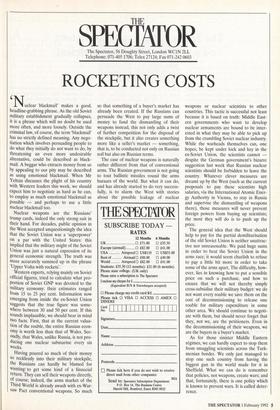THE
SPECTATOR
The Spectator, 56 Doughty Street, London WC1N 2LL Telephone: 071-405 1706; Telex 27124; Fax 071-242 0603
ROCKETING COSTS
'Nuclear blackmail' makes a good,
headline-grabbing phrase. As the old Soviet military establishment gradually collapses, it is a phrase which will no doubt be used more often, and more loosely. Outside the criminal law, of course, the term 'blackmail' has no strictly defined meaning. Any nego- tiation which involves persuading people to do what they initially do not want to do, by threatening an even more undesirable alternative, could be described as black- mail. A beggar who extracts money from us by appealing to our pity may be described as using emotional blackmail. When Mr Yeltsin discusses the plight of his country with Western leaders this week, we should expect him to negotiate as hard as he can, to employ as much emotional blackmail as possible — and perhaps to use a little nuclear blackmail too.
Nuclear weapons are the Russians' trump cards, indeed the only strong suit in their hand. For decades, public opinion in the West accepted unquestioningly the idea that the Soviet Union was a 'superpower' on a par with the United States: this implied that the military might of the Soviet Union was just a natural expression of its general economic strength. The truth was more accurately summed up in the phrase 'Upper Volta with rockets'.
Western experts, relying mainly on Soviet official figures, tried to calculate what pro- portion of Soviet GNP was devoted to the military economy: their estimates ranged from 15 to 25 per cent. Information now emerging from inside the ex-Soviet Union suggests that the true figure was some- where between 30 and 50 per cent. If this sounds implausible, we should bear in mind two facts. First, that at the current valua- tion of the rouble, the entire Russian econ- omy is worth less than that of Wales. Sec- ondly, that Wales, unlike Russia, is not pro- ducing one nuclear submarine every six weeks.
Having poured so much of their money SO recklessly into their military stockpile, the Russians can hardly be blamed for wantingf to get some kind of a financial return. They can sell their weapons directly, of course; indeed, the arms market of the Third World is already awash with ex-War- saw Pact conventional weapons. So much so that something of a buyer's market has already been created. If the Russians can persuade the West to pay large sums of money to fund the dismantling of their weapons instead, this not only adds a twist of further competition for the disposal of the stockpile, but it also creates something more like a seller's market — something, that is, to be conducted not only on Russian soil but also on Russian terms.
The case of nuclear weapons is naturally rather different from that of conventional arms. The Russian government is not going to tout ballistic missiles round the arms bazaars of the world. But what it can do, and has already started to do very success- fully, is to alarm the West with stories about the possible leakage of nuclear
weapons or nuclear scientists to other countries. This tactic is successful not least because it is based on truth: Middle East- ern governments who want to develop nuclear armaments are bound to be inter- ested in what they may be able to pick up from the crumbling Soviet nuclear industry. While the warheads themselves can, one hopes, be kept under lock and key in the ex-Soviet Union, the scientists cannot — despite the German government's bizarre suggestion last week that Russian nuclear scientists should be forbidden to leave the country. Whatever clever measures are dreamt up by the West (such as the current proposals to pay these scientists high salaries, via the International Atomic Ener- gy Authority in Vienna, to stay in Russia and supervise the dismantling of weapons there), those measures will never prevent foreign powers from buying up scientists; the most they will do is to push up the price.
The general idea that the West should help to pay for the partial demilitarisation of the old Soviet Union is neither unattrac- tive nor unreasonable. We paid huge sums in order to beat the Soviet Union in the arms race;.it would seem churlish to refuse to pay a little bit more in order to take some of the arms apart. The difficulty, how- ever, lies in knowing how to put a sensible price on such a purchase, and how to ensure that we will not thereby simply cross-subsidise their military budget: we do not want every rouble we save them on the cost of decommissioning to release one rouble for military expenditure in some other area. We should continue to negoti- ate with them, but should never forget that they, not we, are the petitioners. Even in the decommissioning of their weapons, we are the buyers in a buyer's market.
As for those sinister Middle Eastern regimes, we can hardly expect to stop them from smuggling scientists across the Turk- menian border. We only just managed to stop one such country from having the biggest gun in the world made for it in Sheffield. What we can do is remember that policies, not weapons, create wars; and that, fortunately, there is one policy which is known to prevent wars. It is called deter- rence.


















































 Previous page
Previous page